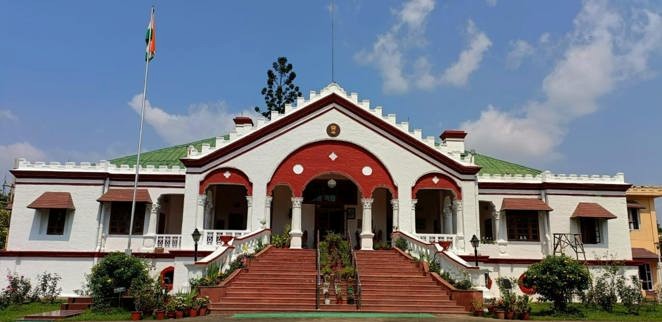After four days of Manipur’s political uncertainties without a popular government since Nongthombam Biren resigned as Chief Minister on February 9, the Central Government on February 13 announced that President’s rule had been imposed in Manipur and the State Assembly placed under suspended animation.
In a notification issued Thursday evening, February 13, Union Home Secretary Govind Mohan said the President had received a report from the Governor “and after considering the report and other information received by me, I (the President) am satisfied that a situation has arisen in which the Government of that State cannot be carried on in accordance with the provisions of the Constitution of India.”.
“Now, therefore, in exercise of the powers conferred by Article 356 of the Constitution and of all other powers enabling me in that behalf, I hereby proclaim that I assume to myself as President of India all functions of the Government of Manipur and all powers vested in or exercisable by the Governor of that State and declare that the powers of the legislature of the said State will be exercisable by or under the authority of Parliament,” the notification published in The Gazette of India stated.
However, it is pertinent to ask how and what led to the proclamation of President’s Rule in Manipur.
The simmering discontent amongst the ruling Bharatiya Janata Party (BJP) MLAs has once again surfaced amidst the violent conflict that has been going on since May 3, 2023, ahead of the already scheduled 7th session of the 12th Manipur Legislative Assembly, and speculation of a no-confidence motion against Nongthombam Biren’s government grew, and it was very apparent.
The majority of the BJP MLAs were not happy with the leadership of Nongthombam Biren as Chief Minister. So everyone was going to make some move in the interest of the public and the state. They said that they could not wait any longer. Days before the Assembly session scheduled to commence on February 10, several BJP MLAs, who have been upset with both Biren’s leadership and the party-led Centre’s management of the Manipur crisis, were putting pressure on the party leadership for a change.
A report quoted a dissident BJP MLA without naming him as saying, “For the last two years, neither the state leadership nor the Centre has come up with a roadmap for peace, and they are just diverting attention by saying that ‘we will seal the border,’ ‘we will implement the NRC,’ or ‘launch a war on drugs.’. But the main issue is the restoration of peace and normalcy. We are saying that if there is no change in this before the Assembly session begins, something big and unprecedented will happen during the session.”
Congress’s plan to move a no-confidence motion against the state government for failing to protect the lives and properties of the people and to end the violence emboldened the anti-Biren BJP MLAs.
The Assembly session scheduled to begin on February 10 happened to be the most opportune timing for both the opposition Congress and anti-Biren BJP MLAs.
Failing to convince the party high command, the anti-Biren BJP MLAs were said to have been plotting a plan to bring down Nongthombam Biren from the Chief Minister on the floor of the House. Anticipating such a possibility, the State Government had been reportedly deferring convening the assembly session until it was left with no option.
There would have been a constitutional crisis in the state if the session had not been held by the second week of February. As per the constitutional provision under Article 174 of the Indian Constitution, six months shall not intervene between its last sitting in one session and the date appointed for its first sitting in the next session. The last 6th Session of the 12th Manipur Legislative Assembly was held for nine days from July 31 to August 12, 2024.
Therefore, if the 7th session of the 12th Manipur Legislative Assembly had not commenced latest by February 11, 2024, the constitutional crisis would naturally prevail.
Amidst this critical juncture of the possibility of a constitutional crisis if the Assembly session was not held as per schedule, Nongthombam Biren resigned as Manipur’s Chief Minister on Sunday, February 9, hours after a meeting with Union Home Minister Amit Shah that followed days of discord within the BJP State unit and the threat of a no-confidence motion in the assembly, nearly 21 months after violent conflict that has killed at least 260 and displaced more than 61,000 people.
The resignation also came five days after the Supreme Court directed a Central Forensics Laboratory for a report on leaked audiotapes that allegedly feature Biren and where he is purportedly heard saying the violent conflict was instigated at his insistence.
Nongthombam Biren submitted his resignation to Manipur Governor Ajay Kumar Bhalla at Raj Bhavan in state capital Imphal around 5.30pm just a day before the State Assembly was scheduled to convene for the budget session.
Notably, he was accompanied by the BJP’s Northeast in-charge Sambit Patra, State President Adhikarimayum Sharda, and 14 MLAs.
Without delay, accepting Nongthombam Biren’s resignation, the Manipur Governor Ajay Kumar Bhalla issued a notification cancelling the 7th session of the 12th Manipur Legislative Assembly by declaring his January order summoning the House on February 10 “null and void,” which led to the constitutional crisis in Manipur.
Now, it is pertinent to ask—why didn’t the Governor ask the Chief Minister to tender his resignation after the Assembly session started to avoid the constitutional crisis? Why didn’t the Governor hold on to the resignation paper for some time without accepting it to let the Assembly session start as per schedule to avoid the constitutional crisis? Or, did the Governor think that a new Chief Minister could be appointed by February 10 and an Assembly session could be held on February 11 not to violate the provision of Article 174 of the Indian Constitution? Or was it just for the ruling BJP to avoid the embarrassing situation facing a no-confidence motion in the Assembly? Or was it to kill two birds with one stone to appease the Kuki-Zomis who have been demanding the removal of Chief Minister Nongthombam Biren and the imposition of the President’s Rule in Manipur since the outbreak of the violent conflict? Or is it to give some cooling time to calm the anti-Biren BJP MLAs as well as an opportunity for Nongthombam Biren to build up his strength during the President’s Rule? Or is the BJP, which commands a thumping majority in the Manipur Legislative Assembly, a political party that cannot nominate its leader? If the BJP cannot nominate its legislature party leader, why did the BJP national leadership advise Nongthombam Biren to tender his resignation? Or why didn’t the BJP national leadership stop him from resigning if they didn’t have an alternative leader beforehand to avoid the constitutional crisis? Or, is the BJP sacrificing their government in Manipur for “national interest”? Or was the Central Government waiting for an opportune situation to impose President’s Rule for some other agenda best known to the Government of India? Is the President’s Rule in Manipur an unavoidable one?












